|
WTIC
Alumni Site
In
Memory of and Designed by Bill Clede
|
WTIC
Radio to Remember
This was
the title on a book published by the station in
1985, and many people remember the "old" WTIC even today. The story of
the
station reads like a history of broadcasting because WTIC dates from
February 10, 1925.
WTIC signed on that evening at 7:45. The Traveler's Walter Cowles gave
an opening speech:
" ... This
service has been installed purely and simply as a new means of
publicity. It is a method
by which we are able to come into close personal relationship with the
public... The hope
and constant aim of this station will be to earn the goodwill,
friendship and confidence
of those who hear us."
A male quartet from the
Mendelssohn Glee Club of New York sang several selections. Mrs.,
Gertrude McAuliffe, gave
a recital accompanied by pianist Mrs. Burton Yaw. Clayton Randall,
Chief Engineer,
assembled a mobile unit, parked it in an alley behind the Hotel Bond,
and brought
listeners the music of the Emil Heimberger Trip performing inside. It
was WTIC's first
remote broadcast. The opening night program lasted until 10:24. Herman
Taylor was
Assistant Engineer.
The first transmitting site were
twin 150-foot towers on the Grove Street building supporting a
T-shaped, center-fed
antenna. Walter Johnson became the first regular announcer in
1925. By the late 50s,
he became President and General Manager.
The
Early Days
Early music programming was almost
entirely live, recorded music was considered of such poor
quality. Local groups
provided it but WTIC soon began hiring musicians. Laura Gaudet was
hired as staff pianist
in 1925. The Travelers Jongleurs, a string quartet conducted by Norman
Cloutier was the
first significant musical group. Later in 1929, Cloutier lead the WTIC
dance band, The
Merry Madcaps, to national fame with a half-hour noontime network
broadcast. WTIC
announcer George Bowe introduced the band.With the addition of the
Traveler's Symphonic
Ensemble in 1926, WTIC built a large reserve of musicians and
announcers.
The 500-watt Western Electric
transmitter served for four years. In 1928, WTIC acquired the Talcott
Mountain site,
bought the first RCA 50,000-watt transmitter, affectionately
know as "Old
Number One", and put it on the air in 1929.
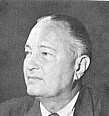 That's the year Paul W.
Morency (at right) joined the station. He was acutely
aware that WTIC had already
developed its own personality. It had become far more than just a
publicity vehicle for
Travelers. WTIC issued its first rate card in 1930. He was also aware
what competitors
were doing. He became WTIC's first President.
That's the year Paul W.
Morency (at right) joined the station. He was acutely
aware that WTIC had already
developed its own personality. It had become far more than just a
publicity vehicle for
Travelers. WTIC issued its first rate card in 1930. He was also aware
what competitors
were doing. He became WTIC's first President.
 Leonard J.
Patricelli (at left) also joined the staff in1929, as a
scriptwriter. He became
the first full time continuity writer in New England. He became program
manager in 1943,
vice president of television programming in 1957, vice president and
general manager in
1963, executive vice president in 1966. He became president of
Broadcast Plaza Inc. in
1967, a title he carried over to the Ten Eighty Corporation. In 1978 he
was named chairman
of the board, holding that position until his death in 1982.
Leonard J.
Patricelli (at left) also joined the staff in1929, as a
scriptwriter. He became
the first full time continuity writer in New England. He became program
manager in 1943,
vice president of television programming in 1957, vice president and
general manager in
1963, executive vice president in 1966. He became president of
Broadcast Plaza Inc. in
1967, a title he carried over to the Ten Eighty Corporation. In 1978 he
was named chairman
of the board, holding that position until his death in 1982.
The "Golden Age of
Radio" was during the 1930s when people couldn't afford going out.
Movies were
inexpensive but you could stay home and listen to a drama with sound
effects that became
the "theater in your mind". You remember Little Orphan Annie, Jack
Armstrong,
Lone Ranger, The Shadow, I Love a Mystery, Inner Sanctum, Lux Radio
Theater, and others.
With vocal characterization and sound effects, your mind could imagine
far more dramatic
scenery than television could ever show.
WTIC produced its own radio
dramas. The WTIC Playhouse went on the air on September 23, 1931 under
the direction of
Guy Hedlund with his repertory company of such actors as Ed Begley,
Edie (Michael) O'Shea,
Gertrude Warner, Louie Nye, and Jan Miner.
"The Wrightville Daily
Clarion" was written and produced by Paul Lucas, who played
Elisha Wright.
Announcer Fred Wade played Cousin Zeke and other roles. Eunice
Greenwood was Sister Janey.
The show ran from May 1933 to March 1939. It was revived briefly in
1949 as
"Wrightville Folks."
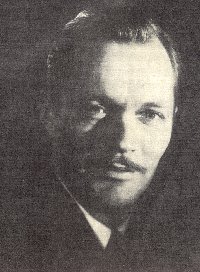 "The Musical Clock" was the
morning show then. In 1934, Ben
Hawthorne (at right) took it over. Everything said was
carefully scripted, then.
Hawthorne was the first announcer to ad lib on WTIC.
"The Musical Clock" was the
morning show then. In 1934, Ben
Hawthorne (at right) took it over. Everything said was
carefully scripted, then.
Hawthorne was the first announcer to ad lib on WTIC.
Although news, sports, and weather
were broadcast regularly as early as1927, there was no local news
staff. Announcers read
news from the Hartford Courant and The Hartford Times. By June1935, the
station subscribed
to Transradio News Service, replaced by Yankee Network in 1936, and
developed its own
Central Connecticut Bureau of Transradio News in 1938.
The flood of 1936 and hurricane of
1938 set the pattern for WTIC's further development -- accurate,
responsible and
community-oriented reporting. The Connecticut River inundated Hartford
in 1936 and WTIC
became the focal point for disaster information. It served the role
again in1938 when a
hurricane swelled rivers all over the state. WTIC was the only station
able to remain in
constant operation. Ben Hawthorne and program manager Tom McCray used a
makeshift
shortwave setup to report live from atop the Travelers Tower.
 When Ben
Hawthorne, host of the popular "Morning Watch" program enlisted in the
Army in
1942, Ben's wife, Travilla, played Rosie the Riveter, that is, she took
over her husband's
duties. Some months later, in March 1943, Bob Steele
(at left) was given a chance to audition for the morning time slot. Bob
had introduced
"Strictly Sports" in 1939. His lively wit and wisdom established him as
one of
the station's unique personalities. The "Morning Watch" eventually
became the
"Bob Steele Show".
When Ben
Hawthorne, host of the popular "Morning Watch" program enlisted in the
Army in
1942, Ben's wife, Travilla, played Rosie the Riveter, that is, she took
over her husband's
duties. Some months later, in March 1943, Bob Steele
(at left) was given a chance to audition for the morning time slot. Bob
had introduced
"Strictly Sports" in 1939. His lively wit and wisdom established him as
one of
the station's unique personalities. The "Morning Watch" eventually
became the
"Bob Steele Show".
"Quiz of Two Cities"
wasn't the first quiz program on the station. WTIC invented the format
in 1927 with a show
called "Jack Says: Ask Me Another." But "Quiz of Two Cities" became an
instant hit when it first aired on October 6, 1940. George Bowe was
emcee for Hartford and
Fred Wade handled the broadcasts from Springfield.
The
War Years
With the approach of World War II,
Paul Morency strengthened his resolve to report accurately. He was less
interested in
getting the story first than he was in getting it right. To coordinate
all news operations
He hired N. Thomas Eaton in October 1941.
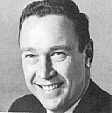 WTIC geared up for the war effort.
Sales manager Irwin Cowper suggested the Morse code letter "V" (dit,
dit, dit,
dah) for Victory be used as the hourly time tone. Patricelli refined it
to the opening
notes of Beethoven's Fifth, and it went on the air on July 4, 1943. The
station originated
the "United States Coast Guard on Parade" program. The emcee was the
youngest
announcer on NBC, Bob
Tyrol (at
right).Tyrol became so enamored he enlisted several months later. After
the war, Tyrol
came home to WTIC.
WTIC geared up for the war effort.
Sales manager Irwin Cowper suggested the Morse code letter "V" (dit,
dit, dit,
dah) for Victory be used as the hourly time tone. Patricelli refined it
to the opening
notes of Beethoven's Fifth, and it went on the air on July 4, 1943. The
station originated
the "United States Coast Guard on Parade" program. The emcee was the
youngest
announcer on NBC, Bob
Tyrol (at
right).Tyrol became so enamored he enlisted several months later. After
the war, Tyrol
came home to WTIC.
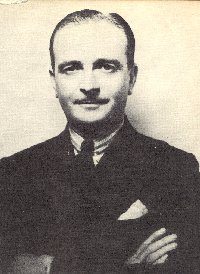 The station
helped to raise more than $1,000,000 in war bonds. Then $l,132,000 to
fight polio. Chief
Announcer Bernard Mullins (at right) directed the project.
The station
helped to raise more than $1,000,000 in war bonds. Then $l,132,000 to
fight polio. Chief
Announcer Bernard Mullins (at right) directed the project.
On July 6, 1944, spectators were
enjoying the Ringling Brothers, Barnum & Baily Circus when the
main tent suddenly
burst into flames. Announcers George Bowe and Bernie Mullins rushed to
the scene and found
uncontrolled panic. Regular programming was cancelled and the station
turned its attention
to Red Cross, fire, and police officials to help quell rapidly swelling
rumors.
Post-War
Period
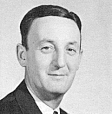 "Cinderella Weekend"was
one of the first audience participation shows. It premiered on August
4, 1947 and remained
in the program lineup until May 1,1953, 289 Cinderellas later. The show
originated from
the Orchid Room at Ryan's Restaurant on Pearl Street. It became such a
hit that announcers
Floyd
Richards (at left) and Bob Tyrol
adapted it for the stage and took it on the road around the state.
"Cinderella Weekend"was
one of the first audience participation shows. It premiered on August
4, 1947 and remained
in the program lineup until May 1,1953, 289 Cinderellas later. The show
originated from
the Orchid Room at Ryan's Restaurant on Pearl Street. It became such a
hit that announcers
Floyd
Richards (at left) and Bob Tyrol
adapted it for the stage and took it on the road around the state.
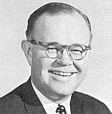
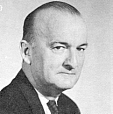 The station continued to present live music into
the 1950s, the audience clamored for the latest recordings. Ross
Miller
(at left) became WTIC's first true disk jockey in the late 1940s when
he brought
"Juke Box Jingles" to his afternoon drive time show. Ross became known
as
"Ross, the Musical Miller". Bob Downes
(at right) was engineer
for "Juke Box Jingles." He later became Bob Steele's engineer.
The station continued to present live music into
the 1950s, the audience clamored for the latest recordings. Ross
Miller
(at left) became WTIC's first true disk jockey in the late 1940s when
he brought
"Juke Box Jingles" to his afternoon drive time show. Ross became known
as
"Ross, the Musical Miller". Bob Downes
(at right) was engineer
for "Juke Box Jingles." He later became Bob Steele's engineer.
WTIC consistently featured shows
for women. Jean Colbert joined the station in1947 and became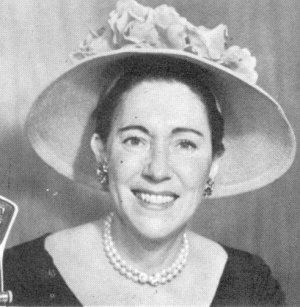 hostess
of
"Radio Bazaar", later changed to the "Jean Colbert Show." Six days a
week, the audience heard her opening at 8:30 am, "Good morning,
everybody."
hostess
of
"Radio Bazaar", later changed to the "Jean Colbert Show." Six days a
week, the audience heard her opening at 8:30 am, "Good morning,
everybody."
Allen Ludden
was hired in the late 1940s as a continuity writer and eventually
helped develop the
concept for "Mind Your Manners", a program for teenagers. The show was
picked up
by NBC and won many awards for youth programming. On May 5, 1951 the
show taped an
interview with a 16-year-old drug addict in prison. It aired on NBC and
became the focus
of a campaign to fight teenage drug addiction. "Mind Your Manners"
continued on
both NBC radio and a local New York television station. Ludden went on
to become the host
of the popular CBS TV game show, "Password".
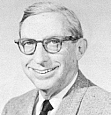 "Your neighbor down the
road" was the unforgettable Frank Atwood
(at left). He launched
"Connecticut Farm Forum" in 1939 as a Saturday morning feature. He
joined the
staff full time as Farm Director in 1946.The Frank Atwood Show aired
daily from 5:30 to
6:45. He developed the WTIC Farm Youth Program involving youngsters in
breeding and
raising purebred dairy and beef calves. Atwood retired in 1970 and Don
Tuttle stepped in
to host the farm show. But the state's farm population dwindled. Later,
Bill Clede
became host of the 5 to 6 am "WTIC
Outdoors".
"Your neighbor down the
road" was the unforgettable Frank Atwood
(at left). He launched
"Connecticut Farm Forum" in 1939 as a Saturday morning feature. He
joined the
staff full time as Farm Director in 1946.The Frank Atwood Show aired
daily from 5:30 to
6:45. He developed the WTIC Farm Youth Program involving youngsters in
breeding and
raising purebred dairy and beef calves. Atwood retired in 1970 and Don
Tuttle stepped in
to host the farm show. But the state's farm population dwindled. Later,
Bill Clede
became host of the 5 to 6 am "WTIC
Outdoors".
By the end of the decade WTIC
upgraded its technology replacing the original RCA 50,000-watt
transmitter with a more
modern 50,000-watt Westinghouse transmitter. It went on the air in July
1947. WTIC
engineers hand-built a 1 kilowatt FM transmitter and put it on the air
on February 5,
1940, as W1XSO. By December the station became permanent as W-53-H
picking up most of its
programming from the AM station. It officially became WTIC FM in
November 1943.
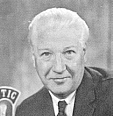 With its broad audience,
WTIC musical programming covered everything from jazz to opera. George
Malcolm-Smith,
editor of The Travelers Beacon, was the resident jazz expert. His "Gems
of American
Jazz" ran from1942 to1951. Robert E.Smith
(at right) was the
station's classical music maven. His "Your Box at the Opera" premiered
in 1945
and ran for 25 years.
With its broad audience,
WTIC musical programming covered everything from jazz to opera. George
Malcolm-Smith,
editor of The Travelers Beacon, was the resident jazz expert. His "Gems
of American
Jazz" ran from1942 to1951. Robert E.Smith
(at right) was the
station's classical music maven. His "Your Box at the Opera" premiered
in 1945
and ran for 25 years.
Then one day in 1973, the news hit
the station like an atomic bomb, "The stations are being sold off by
Travelers."
When Ross Miller hired Bill Clede as Outdoor and Environmental
Director, he tried to
explain the job benefits and got confused. Clede said, "Just pay me
money, Ross, and
I'll take care of myself." The day the news of the sale broke, Ross
passed Clede in
the hallway and said, "What was that you said about job benefits?"
The Washington Post made a deal
for TV3 and Kathryn Graham came to town to cement it. Patricelli and
Tyrol joined with
David Chase to buy the AM FM Radio side and moved it to Chase's Gold
Building on Main
Street. That day marked the end of an era that was not likely to ever
be rebuilt under
then FCC Rules.
Comments by Bill Hennessey (September 30, 2024):
I distinctly recall joining the Staff prior to TV sign-on in 1957 and receiving regular assignments to
run combo in the FM Studio. Robert E. Smith programmed all-classical music and Herman Taylor sometimes
complained about riding levels so low that the signal almost disappeared. (That meant we had to boost the
gain and basically "re-compose" the really quiet musical passages so that they could be clearly heard... .)
Bob Shields, a distant relative of the famous Irish actor Barry Fitzgerald, was on the FM Announcing Staff of part-timers.
John Toye, a Trinity College student was another FMer. (He was a member of "The Trinity Pipes" bagpipe band and practiced
on his chanter while in the studio -- something like what Bill Marks would do on his tuba! Toye eventually married one of the 'TIC office gals -- Nancy Wallace -- and they moved back to Toye's home in England.)
Lani Jurev, formerly of WDRC, also announced on 96.5.
She was a Emerson alum, like Chuck Albert and I, and lived somewhat near me in Glastonbury. In short, FM was
"alive and well" long before it became a rock station.
There was significant simulcasting, especially for newscasts, but I remember how most of us on the regular Announcing
Staff preferred to leave it to the part-timers. It was then not quite ready for prime time.
So there! FM was definitely a separate (but not equal) entity. The "history" deserves to be accurate, and this
info is designed with that in mind.

 That's the year Paul W.
Morency (at right) joined the station. He was acutely
aware that WTIC had already
developed its own personality. It had become far more than just a
publicity vehicle for
Travelers. WTIC issued its first rate card in 1930. He was also aware
what competitors
were doing. He became WTIC's first President.
That's the year Paul W.
Morency (at right) joined the station. He was acutely
aware that WTIC had already
developed its own personality. It had become far more than just a
publicity vehicle for
Travelers. WTIC issued its first rate card in 1930. He was also aware
what competitors
were doing. He became WTIC's first President. Leonard J.
Patricelli (at left) also joined the staff in1929, as a
scriptwriter. He became
the first full time continuity writer in New England. He became program
manager in 1943,
vice president of television programming in 1957, vice president and
general manager in
1963, executive vice president in 1966. He became president of
Broadcast Plaza Inc. in
1967, a title he carried over to the Ten Eighty Corporation. In 1978 he
was named chairman
of the board, holding that position until his death in 1982.
Leonard J.
Patricelli (at left) also joined the staff in1929, as a
scriptwriter. He became
the first full time continuity writer in New England. He became program
manager in 1943,
vice president of television programming in 1957, vice president and
general manager in
1963, executive vice president in 1966. He became president of
Broadcast Plaza Inc. in
1967, a title he carried over to the Ten Eighty Corporation. In 1978 he
was named chairman
of the board, holding that position until his death in 1982. "The Musical Clock" was the
morning show then. In 1934, Ben
Hawthorne (at right) took it over. Everything said was
carefully scripted, then.
Hawthorne was the first announcer to ad lib on WTIC.
"The Musical Clock" was the
morning show then. In 1934, Ben
Hawthorne (at right) took it over. Everything said was
carefully scripted, then.
Hawthorne was the first announcer to ad lib on WTIC. When Ben
Hawthorne, host of the popular "Morning Watch" program enlisted in the
Army in
1942, Ben's wife, Travilla, played Rosie the Riveter, that is, she took
over her husband's
duties. Some months later, in March 1943,
When Ben
Hawthorne, host of the popular "Morning Watch" program enlisted in the
Army in
1942, Ben's wife, Travilla, played Rosie the Riveter, that is, she took
over her husband's
duties. Some months later, in March 1943,  WTIC geared up for the war effort.
Sales manager Irwin Cowper suggested the Morse code letter "V" (dit,
dit, dit,
dah) for Victory be used as the hourly time tone. Patricelli refined it
to the opening
notes of Beethoven's Fifth, and it went on the air on July 4, 1943. The
station originated
the "United States Coast Guard on Parade" program. The emcee was the
youngest
announcer on NBC,
WTIC geared up for the war effort.
Sales manager Irwin Cowper suggested the Morse code letter "V" (dit,
dit, dit,
dah) for Victory be used as the hourly time tone. Patricelli refined it
to the opening
notes of Beethoven's Fifth, and it went on the air on July 4, 1943. The
station originated
the "United States Coast Guard on Parade" program. The emcee was the
youngest
announcer on NBC,  The station
helped to raise more than $1,000,000 in war bonds. Then $l,132,000 to
fight polio. Chief
Announcer Bernard Mullins (at right) directed the project.
The station
helped to raise more than $1,000,000 in war bonds. Then $l,132,000 to
fight polio. Chief
Announcer Bernard Mullins (at right) directed the project.  "Cinderella Weekend"was
one of the first audience participation shows. It premiered on August
4, 1947 and remained
in the program lineup until May 1,1953, 289 Cinderellas later. The show
originated from
the Orchid Room at Ryan's Restaurant on Pearl Street. It became such a
hit that announcers
"Cinderella Weekend"was
one of the first audience participation shows. It premiered on August
4, 1947 and remained
in the program lineup until May 1,1953, 289 Cinderellas later. The show
originated from
the Orchid Room at Ryan's Restaurant on Pearl Street. It became such a
hit that announcers

 The station continued to present live music into
the 1950s, the audience clamored for the latest recordings. Ross
Miller
(at left) became WTIC's first true disk jockey in the late 1940s when
he brought
"Juke Box Jingles" to his afternoon drive time show. Ross became known
as
"Ross, the Musical Miller". Bob Downes
(at right) was engineer
for "Juke Box Jingles." He later became Bob Steele's engineer.
The station continued to present live music into
the 1950s, the audience clamored for the latest recordings. Ross
Miller
(at left) became WTIC's first true disk jockey in the late 1940s when
he brought
"Juke Box Jingles" to his afternoon drive time show. Ross became known
as
"Ross, the Musical Miller". Bob Downes
(at right) was engineer
for "Juke Box Jingles." He later became Bob Steele's engineer. hostess
of
"Radio Bazaar", later changed to the "Jean Colbert Show." Six days a
week, the audience heard her opening at 8:30 am, "Good morning,
everybody."
hostess
of
"Radio Bazaar", later changed to the "Jean Colbert Show." Six days a
week, the audience heard her opening at 8:30 am, "Good morning,
everybody." "Your neighbor down the
road" was the unforgettable Frank Atwood
(at left). He launched
"Connecticut Farm Forum" in 1939 as a Saturday morning feature. He
joined the
staff full time as Farm Director in 1946.The Frank Atwood Show aired
daily from 5:30 to
6:45. He developed the WTIC Farm Youth Program involving youngsters in
breeding and
raising purebred dairy and beef calves. Atwood retired in 1970 and Don
Tuttle stepped in
to host the farm show. But the state's farm population dwindled. Later,
"Your neighbor down the
road" was the unforgettable Frank Atwood
(at left). He launched
"Connecticut Farm Forum" in 1939 as a Saturday morning feature. He
joined the
staff full time as Farm Director in 1946.The Frank Atwood Show aired
daily from 5:30 to
6:45. He developed the WTIC Farm Youth Program involving youngsters in
breeding and
raising purebred dairy and beef calves. Atwood retired in 1970 and Don
Tuttle stepped in
to host the farm show. But the state's farm population dwindled. Later,
 With its broad audience,
WTIC musical programming covered everything from jazz to opera. George
Malcolm-Smith,
editor of The Travelers Beacon, was the resident jazz expert. His "Gems
of American
Jazz" ran from1942 to1951. Robert E.Smith
(at right) was the
station's classical music maven. His "Your Box at the Opera" premiered
in 1945
and ran for 25 years.
With its broad audience,
WTIC musical programming covered everything from jazz to opera. George
Malcolm-Smith,
editor of The Travelers Beacon, was the resident jazz expert. His "Gems
of American
Jazz" ran from1942 to1951. Robert E.Smith
(at right) was the
station's classical music maven. His "Your Box at the Opera" premiered
in 1945
and ran for 25 years.